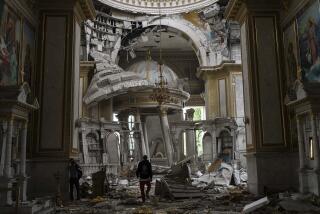Terrorized city returns to routines
MUMBAI, INDIA — With a bit of pluck, even if it was not always heartfelt, a touch of defiance and a dose of the city’s famous resilience, Mumbai dusted itself off Monday from last week’s terrorist attacks and headed back to work.
The trains were reasonably packed, traffic was beginning to resemble its normally chaotic self and shoppers eased back into the stores, even if many still weren’t buying a whole lot.
“Sure I’m scared,” said Roshan Tengra, a fiftysomething homemaker in a purple sari, heading into a Bank of India branch a few blocks from the Taj Mahal Palace & Tower hotel where the most protracted militant attack occurred. “I haven’t been out of my house for three days. But we have to start our lives again. Whatever else can we do?”
Mumbai and much of India has seen its confidence dented by a meticulously planned attack that started late Wednesday. Among the 10 targets were two luxury hotels, a prominent cafe, a Jewish center and a railroad station. When the last militant was killed almost 60 hours later, at least 170 people had died and hundreds were injured.
On Monday, shopping took on political overtones for people feeling a deep-seated anger at what had befallen their city.
“I want to shop just to show I’m not afraid,” said Aparna Malvia, 28, a research scholar, looking at combs and accessories in a street stall in the Colaba Causeway shopping area. “If they dare, let them show themselves now.”
She and others joined commentators and Indian celebrities in slamming their politicians and government officials for their response to the attack.
An infuriated Malvia said she would torture the attackers if she ever got her hands on them.
“Of course I believe in an eye for an eye,” she said. “Human rights are for human beings. I don’t think these guys are human beings -- who could kill children and attack hospitals like this? They’re animals.”
The Leopold Cafe, where nearly a dozen people died when a pair of attackers threw a grenade and emptied two magazines of AK-47 bullets into the dining room, reopened on Monday and a huge crowd showed up.
Diners, well-wishers and the media crowded narrow spaces between tables, and more people peeked in from the sidewalk, gawking at the bullet holes in the plate glass window.
“I came for a bit of solidarity, to show support,” said Jarrod Wood, 41, a musician from Australia who’s lived in Mumbai for the last three years. “The fact that they apparently targeted foreigners makes me feel concerned. I think they’re just trying to hurt India as it becomes more powerful internationally.”
Farzad Jehani, the cafe’s owner, sat down for a chat between cellphone calls and a steady stream of greetings.
“The support people have given us, we never expected such an outpouring. It’s really unbelievable,” said Jehani, who lost two staff members in the hail of bullets. “Our city will come back. But when are we going to put our foot down? We’ve seen attacks in 1993, 2006 and now 2008.”
In the neighborhood around the Jewish center, where six hostages died, including an American rabbi and his wife, food vendors were back in place, most of the small costume jewelry and clothing shops had reopened and foot traffic was picking up. There were also tourists in droves.
Dr. P.N. Vaswani sat in a small electronics shop talking to friends. The urologist hadn’t performed surgeries for three days because he’d been stressed and his hands shook.
On Wednesday, he had gone to help a patient staying at the Taj hotel, only to stumble into the militants’ killing spree as he returned to the lobby. A quick retreat back into the elevator saved his life. He holed up in his patient’s room for 12 terrifying hours until authorities finally rescued them.
“It will take me awhile to recover,” he said. “But the city is getting back on its feet as everyone starts working again, and I hope I’ll be back at it soon as well.”
As the sun set Monday, some of the good news the city hoped for had not materialized. The stock market, which rose modestly Friday, closed down 2.8%, dashing hopes for a repetition of 2006 when the markets staged a rally immediately after a series of train bombings.
The city was also fighting other setbacks. A British government report named India one of the 20 most dangerous places on Earth a few days ago, which will further hurt its tourist trade. And in cricket-crazed India, there’s huge disappointment that foreign teams may avoid the country.
But residents of India’s financial capital say they are taking it in stride. Cellphone messages spread widely Monday urged people to stand up to their politicians and demand more protection.
“Let’s ask for what’s our right,” said one, in clipped cellphone-speak. “Right to live fearlessly.”
At the Gateway of India colonial-era monument near the Taj, with media present, scores of students, tourists and residents gathered Monday evening to show their solidarity, holding banners and singing patriotic songs, the glow of hundreds of candles reflected in their faces.
“We’re trying to tell people that India is unified,” said management student Anshul Kabra, 23, holding a banner expressing condolences for the dead. “Mumbai’s spirit never stopped because of this. We’ll fight back, although some things will take longer to heal than others.”
--
More to Read
Sign up for Essential California
The most important California stories and recommendations in your inbox every morning.
You may occasionally receive promotional content from the Los Angeles Times.










